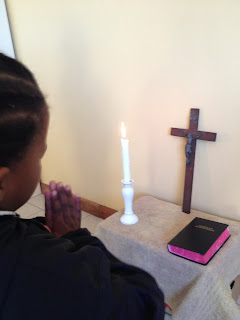This morning i preached at the monastery to wrap up a retreat for the associates of the order. It was great, here are my sermon notes.
Gospel reading- Luke 15:1-10
I would like to open with a moment of silence. And in this
moment I would like us to ponder upon and offer up thanksgiving. Also to just take a moment to reflect on this
fire and the devastation its has caused but also the beauty and new life it
will bring.
External and omniscient God
We just thank you for life, and your comforting touch.
I pray for this time together with you as a community
That you would speak to us
You would move within us
And that you would guide us
We pray all these things through your
Most righteous spirit
Amen
Before I begin I would like
to pose this question that I would like you to keep somewhere in this part of
your brain. Where does church happen?
Todays story opens up with a
description and a characterization of some people.
Tax collectors, and
sinners. Who do these people
represent? Are these the bad guys, the
outcasts, or a marginalized group of people?
At first glance I think of
these people as the villains, I really feel the need to frame their existence
in this story as “the other”. But then,
there are more characters added to this story; The Pharisees and the
scribes. Again, at first glance trying
to figure out whom these people are my thought process is, if the tax
collectors and sinners are the bad guys then the Pharisees and scribes surely
must be the good ones. After all, they must be respectable people, they have
nice important jobs, with, titles.
But then I’m like hold up, If
Jesus has taught me anything; it is to be weary of the establishment. And to question these so called respectable
people. So if we are questioning the
people who are supposed to be good people what are we supposed to do with the
sinners and tax collectors?
Well, if we follow Jesus’
lead, then, that’s right, we invite them over for a dinner party.
I think its important enough
to mention if only for a second, the reaction the so called respectable people
had when they found out who Jesus likes to share meals with. Verse 2 in our gospel reading says, “and the
Pharisees and scribes complained saying this man receives sinners and eats with
them.” There is definitely a hint of
condescension in their speech, maybe a touch of sarcasm and a dash of
skepticism.
Im like, well what’s the big
deal? What’s it matter to them who Jesus
eats with?
Then I think about what
dinner with Jesus and some sinners would look like in real life. Im sure there is a good amount of people sitting
around a big table, tons of loud talking and jokes, and if I know Jesus the way
I think I know Jesus im sure there was a little wine, well maybe a little more
than a little. And if there wasn’t enough I’m sure Jesus would have made
more. Everybody knows that Jesus can
throw a good dinner party.
So then I go back to what the
Pharisees and the scribes said and their accusing and skeptical tones and then I’m
like, maybe they might have a point. If
Jesus is this perfect man why he in the house gettin drunk with the
sinners?
The Pharisees are starting to
look a little better to me now. They're not
in the house with the tax collectors drinking wine eating dinner and having a
good ole time. It sounds like what they
are doing is calling Jesus out. They see
an issue and they are letting him know.
But then, that’s when Jesus gives
them one of his great gifts in the form of a parable.
He says what man of you, having a hundred sheep; if he looses one does
he not leave the 99 and go after the lost one until he finds it? And when he has found it, he lays it on his
shoulders, rejoicing and when he comes home he calls together his friends and
neighbors saying rejoice with me for I have found my sheep which was lost.
I say likewise there will be
more joy in heaven over one sinner who repents than over 99 just persons who needs
no repentance. Or what woman, having ten
silver coins, if she looses one coin, does not light a lamp, sweep the house,
and search carefully until she finds it?
And when she has found it she calls her friends and neighbors together
saying rejoice with me, for I have found the piece, which I lost.
So again I ask the
question, where does church happen? And it seems that Jesus with his parables
takes it a step farther by saying not only, where does church happen but also
answers the question what is the job of a witness?
Jesus flips the apparent judgment
of the Pharisees upside down. If we are
called to witness as Christians should our efforts be exerted on trying to
contain the 99 sheep that aren’t lost?
Should our witness be as God’s watchdogs making sure people don’t get
out of line?
It would seem that Jesus is
challenging that understanding. If you
look at what he said and what he did in this story, oh yeah he’s definitely
challenging that idea. If the most
important thing is finding that lost sheep or that coin you’ve dropped and
having to search through the trash to find it.
First off isn’t it peculiar that Jesus would compare a sinner to a coin that has fallen in the midst of
trash? And in order to find the coin
you’ve got to reach down, riffle through and get your hands dirty in order to
get that coin?
Hmm, maybe Jesus is onto
something here. What it seems like is
happening is Jesus sits around the dinner table eating and drinking with tax
collectors, sinners and the like not because Jesus just feels like having a brie
but because he is ministering to those lost sheep.
I mean it doesn’t make much sense to look for
the one lost sheep in the crowd of 99 or to keep looking in your hand for your
missing coin like its going to magically appear. But we must if we want to find
these things, go out and look for them. They
are lost for a reason. Most of those reasons will make us uncomfortable, but I
believe we are called to step out, to sweep up, bend over, and play in the dirt
a little until we find those missing coins.
In conclusion Id like to pose
the question again. Where does church
happen? Does it happen in these holy spaces,
within these walls around us? Or does it
happen around the dinner table or at the local pub sharing drinks with people
we hardly know. Could it be something as
small as praying for your food in a public space that causes people to look
over and wonder what you are doing?
Perhaps its all of
these, perhaps we must change our
approach if we want to find the lost sheep of the world. Because what works to keep the 99 sheep
together obviously didn’t work for that one sheep that chose to walk away. Amen












































